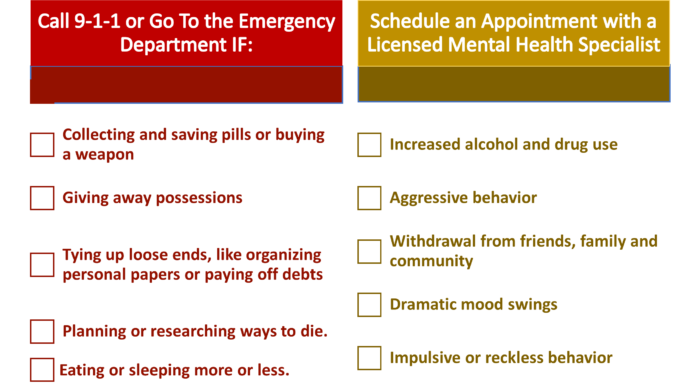If you or someone you know is in an emergency, call The National Suicide Prevention Lifeline at 800-273-TALK (8255), the Mental Health Line at 988, or 911.
Did you know September is National Suicide Prevention Awareness Month? Every year, approximately 703,000 people die by suicide worldwide. In the United States, documented suicide is the 12th most common cause of death and 4th among males between ages 15-29. This is an enormous public health crisis permeating both rich and poor countries.
Research on “best practices” to prevent suicide demonstrates suicide prevention should include a multi-prong process that not only includes the struggling individual and their family members, but also the media, communities, and state and federal government. Changing the stigma surrounding all mental health issues that prevent people from seeking help from licensed mental health specialists is also a crucial measure in suicide prevention.
In honor of Suicide Prevention Month, the Avance Care™ Behavioral Health Team is providing education about suicide, risk factors and ways to act should you or someone you love is thinking about trying to take their own life.
RISK FACTORS
In the United States, suicide rates have increased by 35% since 2019. Risk is particularly highest among vulnerable groups who experience discrimination including refugees and migrants; indigenous peoples; lesbian, gay, bisexual, transgender, intersex (LGBTI) persons; and prisoners. By far, the strongest risk factor for suicide is a previous suicide attempt. 46% of people who died by suicide had a known mental health challenge. Suicide can be prevented if you know the risk and warning signs.
Some other risk factors include:
- Family history of suicide
- Substance use: Drugs can create mental highs and lows that worsen suicidal thoughts
- Intoxication: More than 1 in 3 people who die from suicide are under the influence of alcohol at the time of death
- Access to firearms
- A serious or chronic medical illness
- Gender: More women than men attempt suicide but men are nearly 4 times more likely to die by suicide
- History of trauma or abuse
- Prolonged stress
- Recent tragedy or loss
Warning Signs
Comments or thoughts about suicide like, “I wish I wasn’t here” or “Nothing matters” should never be dismissed as “attention seeking” or “dramatic.” Over time, they can become more explicit and dangerous. If you or someone you love is expressing wishes to be gone or to be dead, we urge you to seek assistance by calling 9-1-1, going to a local emergency department, or scheduling an appointment with an Avance Care Behavioral Health licensed mental health specialist at 919.237.1337.
Avance Care Behavioral Health has over 56 licensed mental health specialists who are highly dedicated, non-judgmental, and extremely skilled at helping people learn to cope with concerning mental health conditions and intrusive thoughts.
If you are concerned about you or a loved one but are unsure whether concern is warranted an Avance Care Behavioral Health licensed mental health professional can help. Please call 919.237.1337 to schedule an appointment.
Additional helpful resources:

